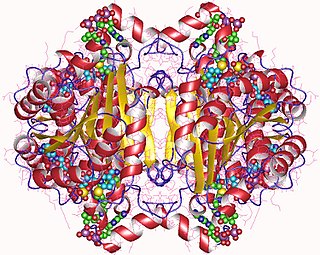
In molecular biology, Beta-ketoacyl-ACP synthase EC 2.3.1.41, is an enzyme involved in fatty acid synthesis. It typically uses malonyl-CoA as a carbon source to elongate ACP-bound acyl species, resulting in the formation of ACP-bound β-ketoacyl species such as acetoacetyl-ACP.

In enzymology, an acetoacetyl-CoA reductase (EC 1.1.1.36) is an enzyme that catalyzes the chemical reaction

In enzymology, a 3-hydroxyacyl-CoA dehydrogenase (EC 1.1.1.35) is an enzyme that catalyzes the chemical reaction
In enzymology, a 3-oxoacyl-[acyl-carrier-protein] reductase (NADH) (EC 1.1.1.212) is an enzyme that catalyzes the chemical reaction

In enzymology, an acyl-CoA dehydrogenase (NADP+) (EC 1.3.1.8) is an enzyme that catalyzes the chemical reaction
In enzymology, an enoyl-[acyl-carrier-protein] reductase (NADPH, A-specific) (EC 1.3.1.39) is an enzyme that catalyzes the chemical reaction
In enzymology, an enoyl-[acyl-carrier-protein] reductase (NADPH, B-specific) (EC 1.3.1.10) is an enzyme that catalyzes the chemical reaction
In enzymology, a trans-2-enoyl-CoA reductase (NADPH) (EC 1.3.1.38) is an enzyme that catalyzes the chemical reaction
In enzymology, a long-chain-fatty-acyl-CoA reductase (EC 1.2.1.50) is an enzyme that catalyzes the chemical reaction
The enzyme 3-hydroxyoctanoyl-[acyl-carrier-protein] dehydratase (EC 4.2.1.59) catalyzes the chemical reaction
In enzymology, a 3-hydroxypalmitoyl-[acyl-carrier-protein] dehydratase (EC 4.2.1.61) is an enzyme that catalyzes the chemical reaction
In enzymology, a [acyl-carrier-protein] S-acetyltransferase is an enzyme that catalyzes the reversible chemical reaction
In enzymology, a [acyl-carrier-protein] S-malonyltransferase is an enzyme that catalyzes the chemical reaction
In enzymology, a beta-ketoacyl-acyl-carrier-protein synthase I is an enzyme that catalyzes the chemical reaction
In enzymology, a beta-ketoacyl-acyl-carrier-protein synthase II (EC 2.3.1.179) is an enzyme that catalyzes the chemical reaction

Fatty-acyl-CoA synthase, or more commonly known as yeast fatty acid synthase, is an enzyme complex responsible for fatty acid biosynthesis, and is of Type I Fatty Acid Synthesis (FAS). Yeast fatty acid synthase plays a pivotal role in fatty acid synthesis. It is a 2.6 MDa barrel shaped complex and is composed of two, unique multi-functional subunits: alpha and beta. Together, the alpha and beta units are arranged in an α6β6 structure. The catalytic activities of this enzyme complex involves a coordination system of enzymatic reactions between the alpha and beta subunits. The enzyme complex therefore consists of six functional centers for fatty acid synthesis.
Very-long-chain 3-oxoacyl-CoA reductase (EC 1.1.1.330, very-long-chain 3-ketoacyl-CoA reductase, very-long-chain beta-ketoacyl-CoA reductase, KCR (gene), IFA38 (gene)) is an enzyme with systematic name (3R)-3-hydroxyacyl-CoA:NADP+ oxidoreductase. This enzyme catalyses the following chemical reaction
3-hydroxydecanoyl-(acyl-carrier-protein) dehydratase (EC 4.2.1.60, D-3-hydroxydecanoyl-[acyl-carrier protein] dehydratase, 3-hydroxydecanoyl-acyl carrier protein dehydrase, 3-hydroxydecanoyl-acyl carrier protein dehydratase, β-hydroxydecanoyl thioester dehydrase, β-hydroxydecanoate dehydrase, beta-hydroxydecanoyl thiol ester dehydrase, FabA, β-hydroxyacyl-acyl carrier protein dehydratase, HDDase, β-hydroxyacyl-ACP dehydrase, (3R)-3-hydroxydecanoyl-[acyl-carrier-protein] hydro-lyase) is an enzyme with systematic name (3R)-3-hydroxydecanoyl-(acyl-carrier protein) hydro-lyase. This enzyme catalyses the following chemical reaction

Ketoacyl synthases (KSs) catalyze the condensation reaction of acyl-CoA or acyl-acyl ACP with malonyl-CoA to form 3-ketoacyl-CoA or with malonyl-ACP to form 3-ketoacyl-ACP. This reaction is a key step in the fatty acid synthesis cycle, as the resulting acyl chain is two carbon atoms longer than before. KSs exist as individual enzymes, as they do in type II fatty acid synthesis and type II polyketide synthesis, or as domains in large multidomain enzymes, such as type I fatty acid synthases (FASs) and polyketide synthases (PKSs). KSs are divided into five families: KS1, KS2, KS3, KS4, and KS5.
Elongase is a generic term for an enzyme that extends the length of fatty acid. The nomenclature is not applied rigorously. Often, elongase refers to enzymes that produce very long chain fatty acids. Sometimes, elongase also includes unsaturases, which introduce C=C double bonds in the backbone. Because fatty acids and their derivatives are biochemically influential, elongases are of considerable interest.








